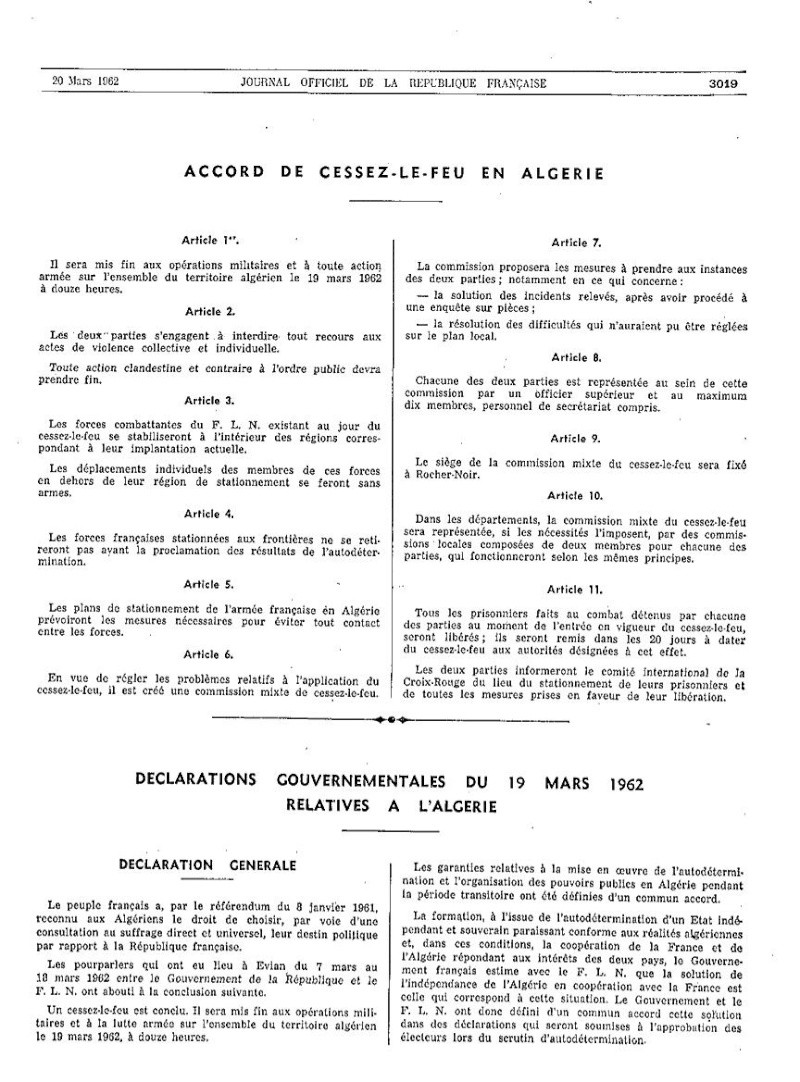Algeria and Switzerland, a common history
Switzerland, and Geneva in particular, played a leading role in the negotiations leading to Algeria's independence. By making its diplomacy and infrastructure available for the holding of secret talks on its territory and on the border, the Swiss Confederation allowed the Algerians to prepare themselves, on secure ground, for a calm debate. This presence in Switzerland has also facilitated communication to the world media. The presence of the Swiss in Algeria since the 1830s also contributed greatly to considering the decolonization process necessary for France as well as for the Confederation, its partner.
In 1961, the Swiss government, through its Federal Councillor for Foreign Affairs Max Petitpierre, provided diplomatic and logistical support to organize negotiations between the Provisional Government of the Republic of Algeria (GPRA) and a French delegation willing to accept the principle of Algerian self-determination. "For France, the government of Charles de Gaulle wanted to get rid of the Algerian ball and chain, because they had other objectives at the international level. Switzerland's contribution allowed it to have this financial weight less," explains historian Marc Perrenoud, interviewed at the symposium "60 years of the Accords of Evian, from one shore to the other" on March 19, 2022 in Lausanne.
The Swiss in French Algeria
The question of Swiss involvement in the Algerian cause must be linked to the presence of Swiss citizens since the end of the first part of the 19th century. A participation in the French colony taking the form of a Swiss presence in Algiers or on a territory of 20,000 hectares near Sétif in the Constantinois, a territory exploited by the "Compagnie genevoise des Colonies suisses de Sétif" created by François-Auguste Sautter de Beauregard in 1853, a man who came in search of wealth by involving several shareholders of the "colony" among whom was the founder of the Red Cross Henry Dunant.
The Swiss history in Algeria will continue until 1962. That is to say a little more than 130 years of presence at the side of colonial France. Because "it was the French who attracted these Swiss to Algeria..." analyzes the historian Marisa Fois, assistant professor at the University of Geneva and author of the book Héritages coloniaux, les Suisses d'Algérie (1). "Switzerland wanted to participate in this French colony. It wanted to export something. Paradox of history "if Switzerland was not a colonial power, it had to suffer the comparable consequences to other European colonial powers" adds Marisa Fois. "In 1967, an association linked to colonization was born, the Association of Swiss spoliated from Algeria and overseas. Other paradox of history, it was born in Geneva, city of international cooperation, neutrality and headquarters of international organizations. This return to the country of former Swiss colonists will not go well, the financial compensation for this forced repatriation will be paid to the plaintiffs being almost non-existent.
A Swiss presence for the FLN
At the end of the 1950s, the Algerian National Liberation Front (FLN) had sent one of its best elements to Switzerland to be their representative in contact with the Swiss political power. Taïeb Boulharouf, after having been an activist in the FLN in France, became a representative of the Provisional Government of the Algerian Republic in 1958. In 1960, he was the Swiss relay between the GPRA and France. With Ahmed Boumendjel, he was present at the meetings in Lucerne and Neuchâtel in February 1961, then at the Evian I negotiations in Lugrin as well as at those of Evian II in March 1962 (2).
His son remembers a father who was popular in the bourgeois and political circles of French-speaking Switzerland. Taïeb Boulharouf had chosen to live near the Lausanne train station at the Hôtel Orient on Avenue d'Ouchy. "My father was called "Pablo" for his "Latino lover" side" says one of his three sons, Jelil Boulharouf. A power of seduction that allowed the activist to gain the confidence of the Genevan diplomat Olivier Long. The diplomat accepted to push Taïeb Boulharouf's request furter. His desire to enter in negotiation with France with the help of this Swiss new friends was fulfilled when Long went to speak to Max Petitpierre, the Swiss councillor in charge of the Department of foreign affairs. An operation crowned with success, leading to the signing of the Evian Agreements on March 18, 1962.
Cover-picture of Henri Guisan in the Colony of Sétif, Algeria in 1951 (Federal Archives)
(1) - "Héritages coloniaux, les Suisses d'Algérie" by Marisa Fois, historian University of Geneva, published within the "Présent et Histoire" collection, edited by Seismo seismoverlag.ch/fr/daten/herit...
(2) - The negotiations were held on 17 and 18 March at the Hôtel du Parc in Evian. The accords were published in the French Official Journal on March 20, 1962: 
Taken out of the « Governmental declarations of March 19, 1962 relating to Algeria » available here : fr.wikipedia.org/wiki/Accords_...
Discover and enrich the history of International Geneva

A time for dialogue
In 2003, a man from Geneva initiated a dialogue between Israelis and Palestinians far from the diplomatic arena. His aim: to achieve a two-state solution. The RTS archives bear witness to the dynamic generated by this ‘Geneva Initiative’.